
Should I launch my product on Shopify or Amazon?
Product launch dilemma: Shopify or Amazon? We break down the pros and cons of each, helping you choose the best platform for quick sales vs. long-term brand building.

Google is the go-to search engine for most Australians. It’s so widely used that a world without Google is unimaginable.
But that situation could become a reality in the near future.
With Google threatening to pull its search engine from Australia, many forward-thinking SEOs are taking a closer look at the opportunity Bing presents.
Competition on Bing is much lower and the businesses that secure a high ranking now can achieve a significant competitive advantage should the Microsoft search engine take the place of Google.
As of January 2021, Bing had a 12.54% share of the global search engine market.
The share of searches conducted on Bing has increased by over 85% in the last four years.
With Google’s response to proposed new legislation in Australia, interest in Bing has never been so high.
If we look at Google Trends, we can see that more and more people are using Google to find the Bing search engine:
There’s also some evidence that traffic from Bing is more valuable than traffic from Google.
For many sites, Bing traffic has a lower bounce rate, a higher average session duration, and higher conversion rate.
Does Bing matter for SEO?
Yes!
Bing is becoming more popular, and there’s an opportunity to get a head start on your competitors and establish your site in the Bing rankings.
Google has dominated search for over 20 years.
Bing has been around for half of that time, and SEOs have largely ignored the platform.
There’s a misconception that if you rank well in Google, you’ll rank well in Bing too.
But Bing has its own algorithm and ranking factors.
Just because you’re doing okay with Google, doesn’t mean that will automatically translate to Bing.
Let’s take a look at an example.
Here are the top 3 results from Bing and Google for the same search query:
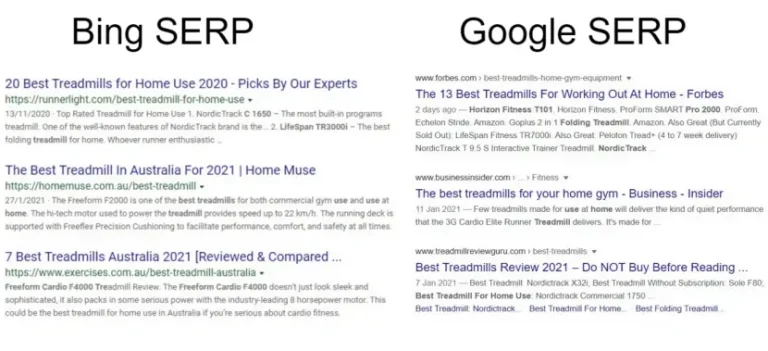
As you can see, the top 3 results for Bing are entirely different from the Google results.
To achieve a high ranking on Bing, you need to understand how its algorithm works and the steps you can take to make your site more appealing to the search engine.
The first step is to ensure that Bing indexes your website.
You can do this by going to Bing and searching for “site:mywebsite.com.”
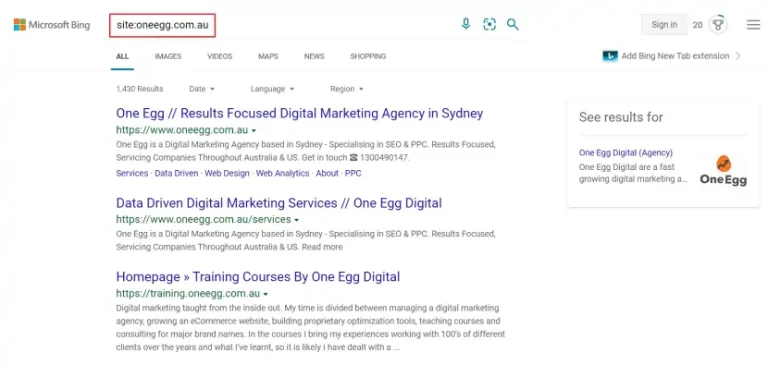
This will show you the pages of your website that are indexed by Bing.
If your site hasn’t been indexed already, you need to register your site with Webmaster Tools and submit your site map.
Webmaster Tools is Bing’s equivalent of Google Search Console.
Once you’ve registered, ensure that your site is free of 404 errors and redirects to avoid being penalised, and submit your sitemap.
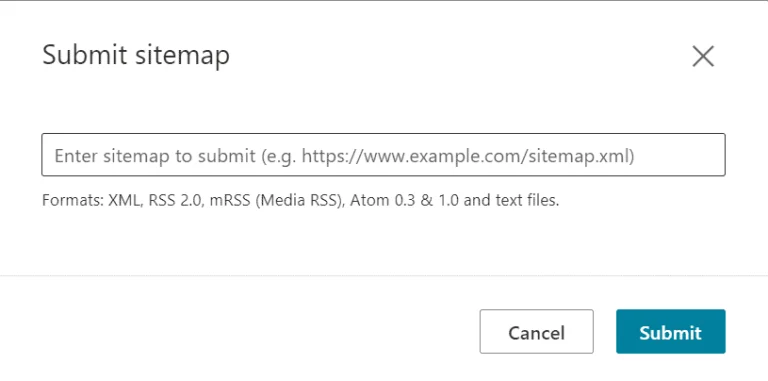
You can also use the URL Inspection Tool to check if a page has been indexed.
Local SEO is just as important for Bing as it is for Google.
Like Google, Bing wants to show the most relevant and useful local results to its users.
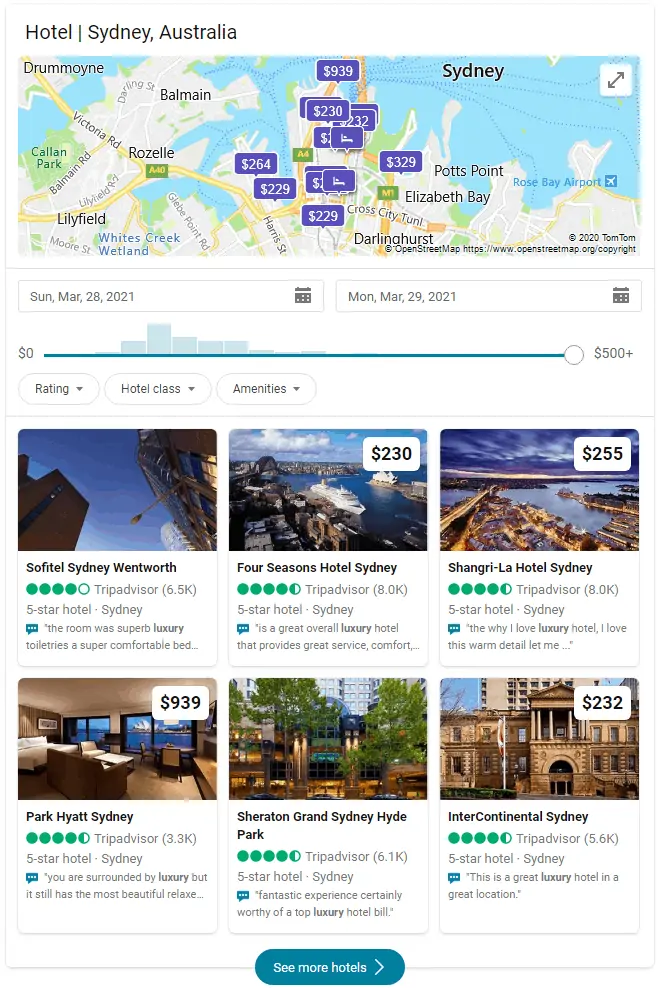
Bing Places For Business is the equivalent of Google My Business.
You can claim your business and create a listing to improve your visibility in local search results.
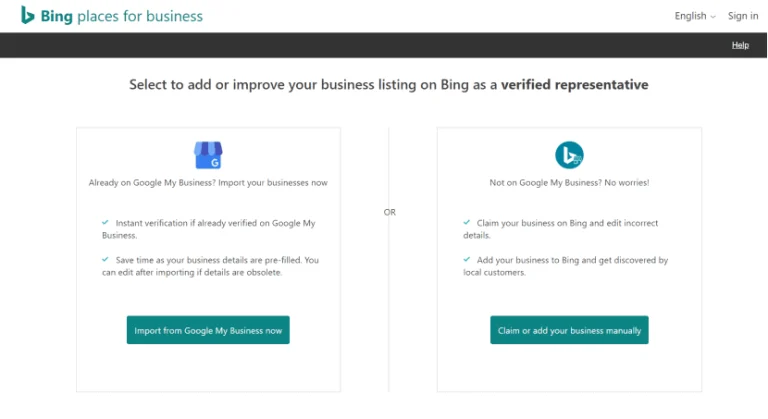
If you’re already registered on Google My Business, the process is straightforward and fast.
Bing also takes social signals and third-party data into account when deciding on ranking.
You can increase your chances of ranking high in Bing local results by creating and optimising your Facebook business page.
Close keyword matching is vital for Bing SEO.
Keywords are still important for Google, but with every algorithm update since Hummingbird in 2012, search intent and semantic search have become more influential.
Bing isn’t as advanced when it comes to semantic search and user intent.
While Google does a good job of deciphering your content’s meaning and matching it to a user’s search, exact keyword matches are much more important for Bing.
This means keyword research and SEO copywriting are some of the most important aspects when it comes to ranking at the top of Bing search results.
You should include your target keywords in your title and meta description to help Bing understand your web page.
Here’s what Bing Webmaster Guidelines say:

You can make your titles and meta descriptions more “descriptive” by including your target keywords.
Just like Google, you should aim to keep your titles under 65 characters and meta descriptions under 160 characters to ensure they are displayed in full in the search results.
The URL of a page is also more significant for Bing SEO.
You can often find top results with domains that match the exact keywords used in a search query.
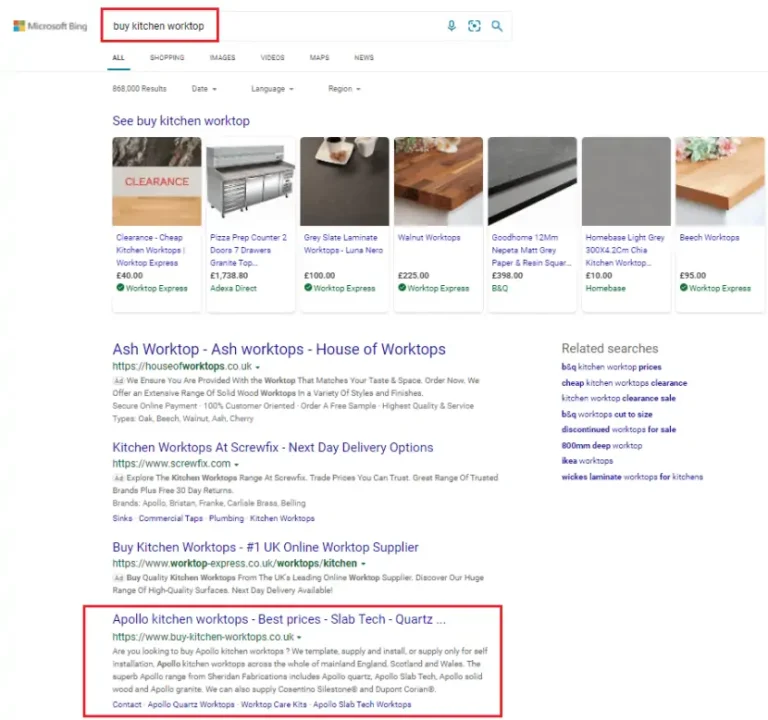
In the above example, the top organic search result’s URL is an almost exact match to the search query.
If we conduct the same search on Google, the domain doesn’t rank on the first page of results.
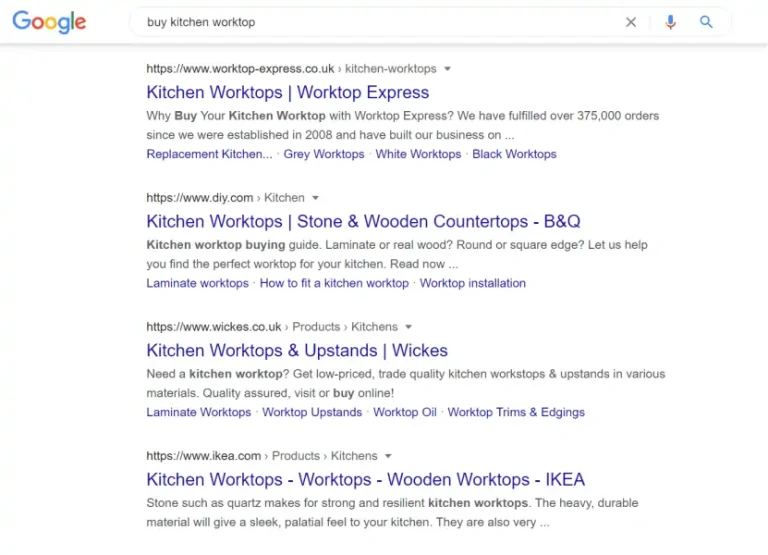
You don’t need to change your domain name if you’ve already launched your site, but including keywords in your URLs can help you rank higher in Bing.
User engagement is one of the most important Bing ranking factors.
This includes clickthrough rate and bounce rate.
Back in 2010, Bing’s Senior Program Manager Lead Steve Tulis confirmed:
“If things in the search results that do not get clicked on, they will likely lower the ranking.”
Clickthrough rate is the proportion of users who click on your page when it is displayed on the search engine results page (SERP).
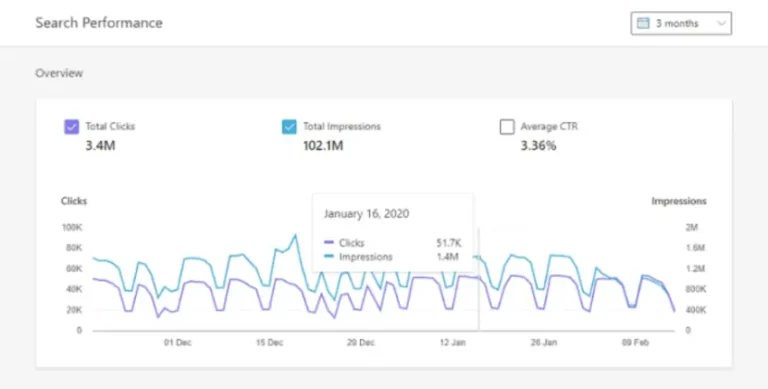
You can increase your clickthrough rate by optimising your titles and meta description to be more appealing and clickable to users.
Bounce rate is another key user engagement metric.
If a searcher clicks on a result, lands on the page, and immediately click back to the SERP, it sends a signal to Bing that the page doesn’t match the search query or doesn’t offer much value.
Here’s how Bing’s former Senior Product Manager Duane Forrester describes it:
“We are watching the user’s behaviour to understand which result we showed them seemed to be the most relevant in their opinion, and their opinion is voiced by their actions.”
The more engaging your content and the more clickable your titles and meta descriptions, the more searchers will click your results, and the less likely they are to bounce back to the SERP.
Backlinks are important for both Google and Bing SEO.
But there is a difference in how each search engine’s algorithm uses backlinks to determine search ranking.
Google is more focused on the quality of the backlinks pointing to a page and website.
Although Google PageRank has been removed, the focus is still on the link juice that flows to your site through your backlinks.
If a website has an extensive backlink profile, it’s not unusual to find a new page with only a few links at the top of the SERP.
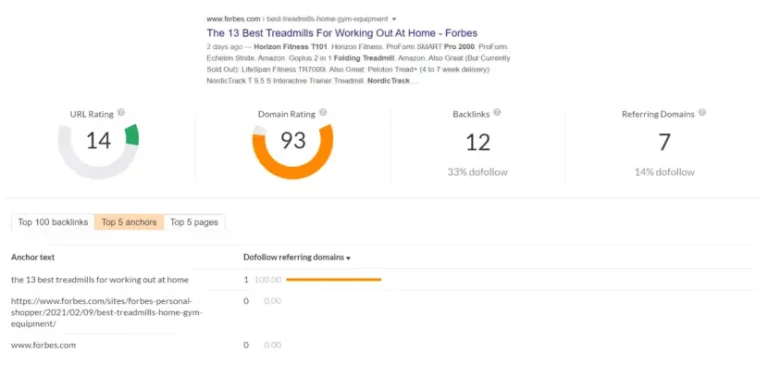
With Google, a few high-quality links can be worth more than hundreds of backlinks from lower-quality sites.
If we look at the top Bing result for the same search query, you can see the difference in the number of backlinks pointing to the page.
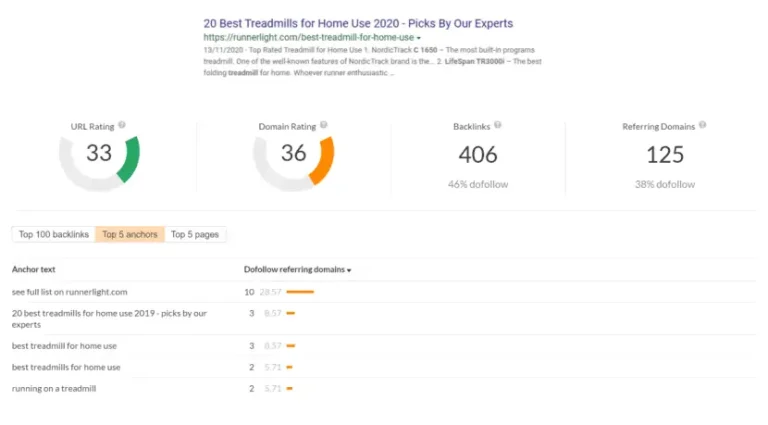
It’s also worth noting that the anchor text is more important for Bing than for Google.
If you want to increase your ranking with Bing, growing your backlink profile and optimising anchor text can be an effective SEO tactic.
However, PBN (private blog networks) and link farms breach Bing guidelines and can result in penalties.
Always use white hat link building techniques.
Social media engagement can influence Bing search results.
Bing Webmaster Guidelines:
“Social media plays a role in today’s effort to rank well in search results. The most obvious part it plays is via influence. If you are a social influencer, your followers tend to share your information widely, which in turn results in Bing seeing these positive signals. These positive signals can have an impact on how your site ranks organically in the long run.”
If we look at the top three results on Bing for the search query “best cycling shoes”, you can see the top three results have significant social media engagement.

For the top three Google results, the engagement level is much lower on average, with the third result generating zero social media engagement.
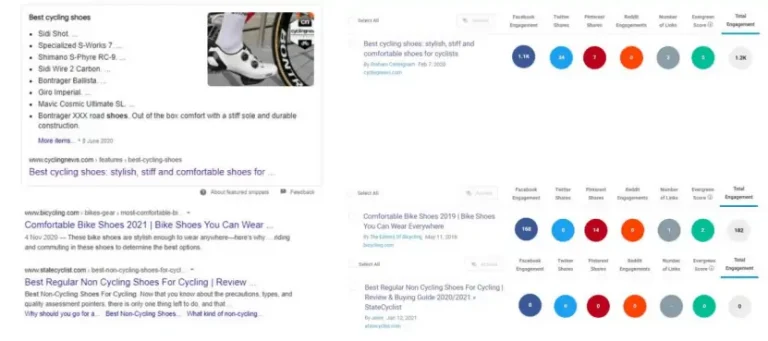
Receiving likes, comments, and shares on social media can improve your ranking in Bing.
Maintain an active social media presence to grow your following and encourage your visitors to like, share and comment on your content to increase your social signals and improve your Bing search ranking.
Just like Google, you need valuable well-written content to rank high in Bing search results.
Fabrice Canal, Principal Program Manager at Bing, explains the importance of high-quality content:
“People are searching, providing insights on what they are looking for. We do believe that this is useful data that is helping us to help them to retrieve the best content, satisfying customer, or driving the best content on the Internet.”
Bing provides webmasters with content quality guidelines based on three pillars:

Authority
Bing uses social signals, citing sources, backlinks, and author profiles to determine a web page’s authority.
For example, healthcare content is much more likely to rank higher if written by a verified medical professional that cites high authority sources.
Utility
Does the page contain all the information a searcher needs, or will they need to click away to another website to find supporting information?
Utility is about the usefulness of your content.
You can include supporting images, videos, and multimedia to backup your content and provide all the information needed to answer the search query.
Presentation
The way you present information is also important.
If a page has distracting popups or ads that disrupt the user experience and make it harder for users to find what they are looking for, it won’t rank high in Bing search results.
Bing doesn’t have a share of the mobile search market, but that doesn’t mean you can neglect mobile users.
In 2015, Microsoft announced that it was taking steps to give mobile-friendly websites higher rankings in Bing search results.
You can analyse your site using Bing’s Mobile Friendliness Test Tool to see if your site is friendly for mobile users.
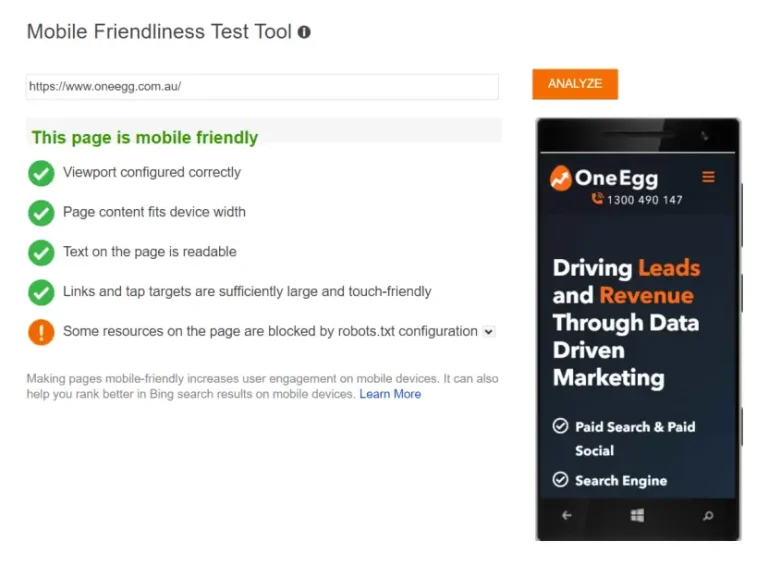
The tool will assess your site and tell you if it meets Bing’s parameters for mobile users.
This can include:
Essentially, Bing has the same mobile-friendly standards as Google.
It should be easy for mobile users to navigate your site, read your content, and find what they are looking for.
If you’ve already optimised your site for mobile users, you don’t need to do anything extra for Bing.
Don’t use black hat SEO tactics to boost your ranking on Bing.
While you may see a short-term lift in your ranking, these techniques violate Bing’s guidelines and can get your website penalised and removed from the index.
Black hat SEO tactics include:
If Bing discovers that your site violates its guidelines, your site can be removed from the index, and you’ll lose all of your rankings.
There’s heaps of information online about Google penalties, but there’s not much content out there about Bing penalties aside from an outdated blog post from Bing Webmaster.
But the Webmaster Tools interface has been updated, and there’s no longer a Summary Tool that shows you if your site has been blocked.
The easiest way to see if your site has been penalized is to check your Google Analytics to see if you’ve experienced a drop off in traffic from Bing.
Most sites receive penalties for doing something they know is a breach of Bing’s guidelines.
If you feel that you’re being penalized unfairly, you can contact Bing Webmaster Support and request a reconsideration.
It’s always best to abide by search engine guidelines and avoid any black hat SEO tactics.
There are lots of legitimate ways to boost your ranking without risking a ranking penalty.
Bing is much more SEO friendly than Google.
There are a bunch of free tools and resources to help you understand Bing’s algorithm and make your site more appealing to the search engine.
The Webmaster Guidelines are much more concise and easier to digest than Google’s guidelines.
You can quickly get up to speed with what Bing encourages you to do, and what can negatively impact your ranking.
Bing offers a comprehensive set of free tools to help you monitor your site and improve your ranking.
If you’ve already
set up Google Search Console, you can get your site registered for Bing’s Webmaster Tools in minutes.
Keyword Research Tool
You can use Bing’s Keyword Research Tool to inform your content strategy.
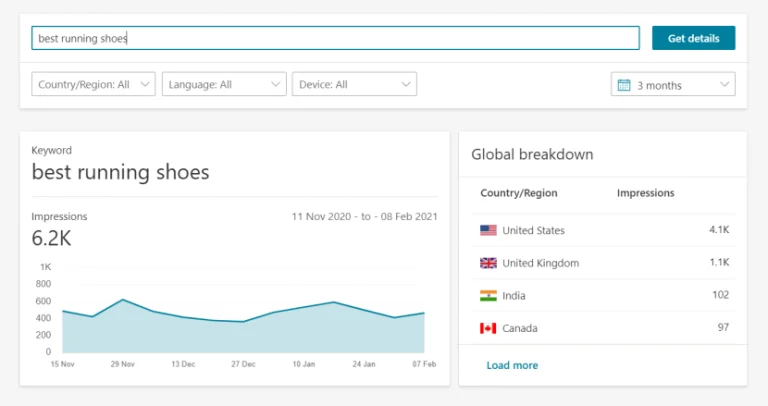
Unlike Google’s Keyword Planner, you can see an exact number of impressions (searches), rather than a broad estimate.
URL Inspection Tool
The Bing URL Inspection Tool is an easy way to analyse your web pages and see if there are any SEO issues that could impact your ranking.
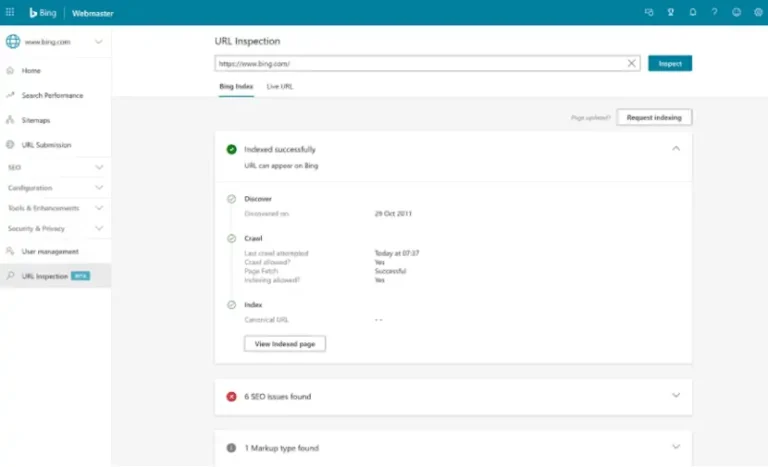
Enter your URL, and the tool will show you the last time Bing crawled your page, and offer suggestions to improve your ranking.
Backlinks Report
The Bing Backlinks Report shows the backlink profile of your website.
You can see the total number of referring pages, referring domains, and the anchor text used to link to your site.
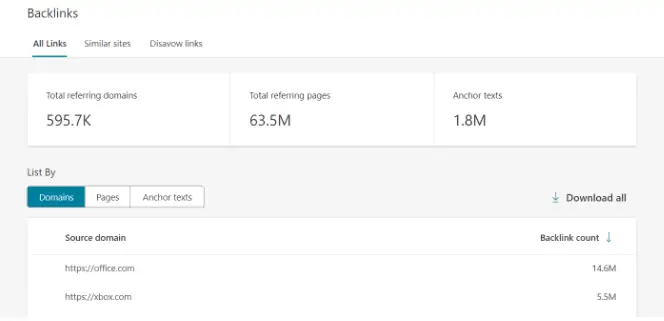
You can even compare your backlink profile with up to two competing websites to identify opportunities for link building.
Microsoft Clarity
Microsoft recently launched the BETA version of Clarity.
Clarity is a new tool that provides in-depth insights about your site visitors to help you make informed decisions.
You can see heatmaps, session playbacks, and detailed visitor behaviour insights.
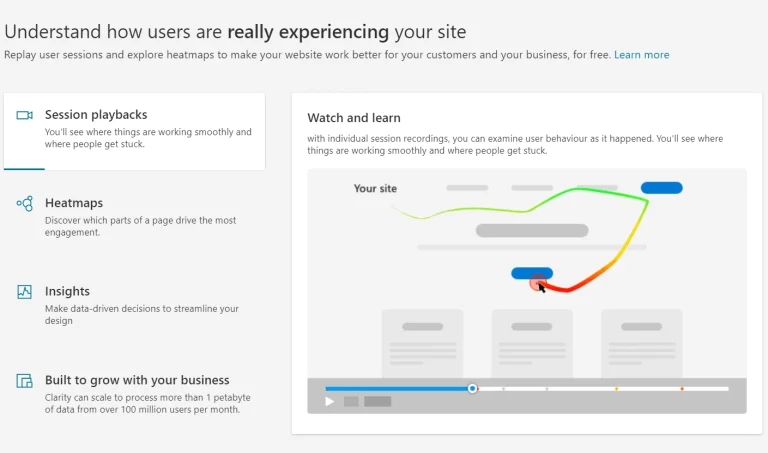
These types of advanced tools usually come at a high price.
You can add Clarity to your site for free.
That’s unbelievable value.
If you haven’t set up Webmaster Tools already, it should be the first thing you do after reading this guide.
SEO is continually changing and evolving.
It’s not a set and forget marketing strategy.
New competitors can challenge for the top spots, algorithm updates can influence ranking factors, and the search engine market can change.
It’s unlikely that Google will leave Australia. But that doesn’t mean you should neglect Bing.
The number of searches conducted on Bing has increased every year since the Microsoft search engine was launched.
You should be taking advantage of Bing SEO to drive more potential customers to your site.
Is your website ready for Bing?

Product launch dilemma: Shopify or Amazon? We break down the pros and cons of each, helping you choose the best platform for quick sales vs. long-term brand building.

Master Amazon cash flow! Learn to calculate your product’s cash cycle, from manufacturing to payout, using Amazon’s “Sell Through Rate.” Get accurate forecasts for smarter scaling.

Neil Patel recently shared powerful tips on email marketing success—think cleaner lists, smarter personalization, and value-packed content. His key message? Email isn’t dead; it’s evolving.
Subscribe to receive exclusive industry
insights & updates
Copyright © 2014 – 2025 One Egg. All rights reserved.
Subscribe to receive exclusive industry insights & updates